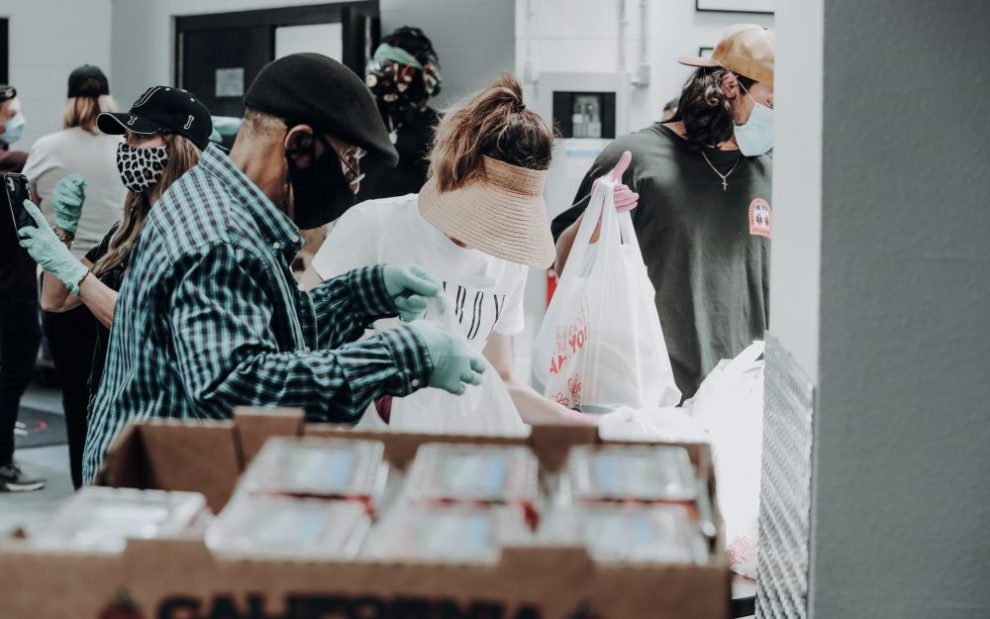“Welcome to the Hungry Snail!” My daughter greets me at the bottom of the stairs with a napkin draped over her arm, gesturing to the dining room where she and her brothers have set the table—placemats, cloth napkins, and all—in preparation for dinner service at their imaginary restaurant.
Even in their play, my children already hear the call to service and care of one another. When they aren’t doling out macaroni and cheese and apple slices in their fine dining establishment, they build shelters for insects, tuck in baby dolls, and pretend to do farm chores, often choosing other-centered tasks in their imaginary play. This all comes with healthy doses of disagreement, of course, but like most adults they are drawn to serve beyond themselves.
But U.S. society seems to have stripped the idea of service of its richest meanings, leaving us with a watered-down, compulsory item to check off for school hours or to prepare for confirmation. Living in service to others doesn’t mean completing a prescribed number of hours of charity work or volunteering at a soup kitchen once a month. Rather, we serve one another best when we see our individual flourishing wedded to that of the whole community, particularly to those systematically excluded or oppressed. Service in its highest form germinates in the heart and blooms forth through our hands and feet in concrete ways that build the beloved community here on Earth.
As early as the 12th century, the word service referred to public religious worship or liturgy, which itself means “the work of the people.” I still remember the first few times I attended Mass: I was awestruck that I, too, had a role to play, both in the responses I read and how I used my body by standing, sitting, and kneeling. I tell my children we go to Mass to “say thank you to God” and that it is important to do this as part of a community. That, too, is service to God, which we do through our prayers of gratitude and adoration, but also by showing up for one another and witnessing to our shared struggles and faith.
The Catholic term for worship echoes the idea of liturgy as service: Mass comes from the final words of the ritual: “ite, missa est,”which means literally “go, it has been sent.” The dismissal that sends us forth into mission, into doing the things Jesus taught us, became the very name for our communal prayer. Even Daniel Berrigan, the Jesuit activist best known for his risky public protests against war and nuclear weapons, understood prayer and liturgy as the foundation of his service. Speaking of celebrating the Eucharist where weapons of war were created, Berrigan writes, “It’s enough to say: I prayed where prayer was forbidden because death was in charge.” Particularly in the darkest corners, our prayers serve God and serve the world where it is needed most.
But we cannot stop with prayer alone. Berrigan celebrated the Eucharist in places of death in hopes that we would stop breaking the bodies of others for our own advantages and instead become broken for others. Service sometimes means sacrificing our own comfort and privilege to center the needs of those who have been broken by capitalism, colonization, systemic racism, war, poverty, and other machines of death rampant in our society.
I have come directly in contact with these death-dealing in systems at the U.S.–Mexico border. Sitting in a Tucson, Arizona courtroom I witnessed more than 40 human beings summarily deported in a span of 60 minutes, each individual simply a number on a checklist rather than someone’s beloved parent, child, or sibling with a unique story and background. Many had clearly been plucked straight from the desert to the courthouse, put in handcuffs and arrested for the crime of fleeing violence and poverty in their countries of origin. My only service in that moment was paying attention and allowing myself to be changed and motivated to act accordingly when I returned home.
That Arizona border trip was the first time I took college students on an immersion experience as opposed to a service trip. And yet, the service of listening to and learning from those with vastly different lives changed these participants far more than hammering nails for a week would have. Once they had seen, they could no longer look away. Even after returning to New England, a world away from Border Patrol and a razor wire-topped wall, they sought out ways to serve migrants and people on the move, getting involved in immigrant groups locally and advocating on a national level for a more humane policy at the border.
Last October, I led a group with the Sisters of Mercy to the Rio Grande Valley for a similar immersion opportunity, this time hosted by one of our partner ministries, ARISE. The women of ARISE offer an incredible example of service that begins with the concrete needs of the community. The organization educates and empowers women to advocate and enact change and fans out from local colonias to state and even federal governments, demanding a better world. Their version of service encompasses everything from lobbying for streetlights in neighborhoods and protesting unjust immigration policies to classes in homeopathic medicine and hosting border witness programs like the one we attended.
Just like my students, Mercy participants had their own hearts broken open by those they met and returned home writing letters to the editor, giving presentations, sharing their experiences, procuring items and funding for those living at the border, and serving this community in ways they never expected. The service ARISE offered planted new seeds and continues to grow ever more advocates.
The Sisters of Mercy themselves also use a multi-pronged approach entrenched in the gospel, and professed sisters take a fourth vow of service in addition to the traditional three shared by other orders. Through prayer we may be moved to charity, but through charity we must also be moved toward justice, the riskier venture that requires us not just to feed the hungry and visit the prisoner, but also to change the system.
Our Catholic tradition, with its both/and approach, encourages us to embrace service as prayer and action. We look to scripture and tradition, faith and works, charity and justice. As humans created in God’s image, we have inherent rights to dignity and mandatory responsibilities for one another. We must respond to injustice in the world as if it has something to do with our own lives, which, of course, it does.
So as we read about service as a central component in our churches, schools, and even secular organizations, we are called to ask what Catholic volunteer service looks like and what it demands of us. It should be rooted in our inmost being, but ultimately it bursts forth from our own comfort and focuses on one another, on community, and on our aching Earth and world.
As my children grow and eventually cease their imaginary play, I hope they continue responding to the call of service, the kind that emerges when we see a need and cannot help but act for migrants, for peace, for a true beloved community. In the words of Dan Berrigan, Christians indeed have “not just a calling to live well, decently, inwardly, faithfully. But a calling to give ourselves to all lives, indeed to all of life.”
Image: Unsplash/Joel Muniz













Add comment